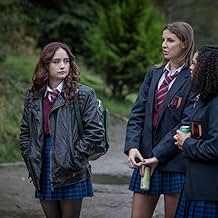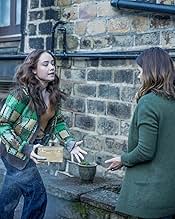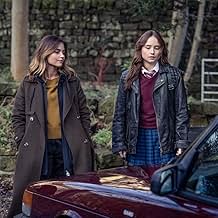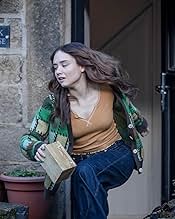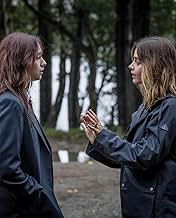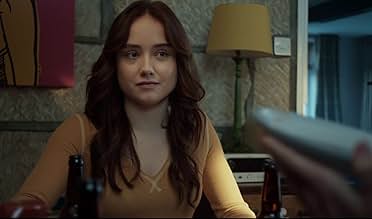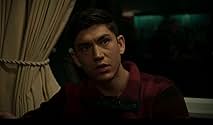Acompanha a detetive Ember Manning, que precisa descobrir como um incêndio em uma casa de férias está ligado a um jornalista de podcast que investiga o caso de uma pessoa desaparecida e um t... Ler tudoAcompanha a detetive Ember Manning, que precisa descobrir como um incêndio em uma casa de férias está ligado a um jornalista de podcast que investiga o caso de uma pessoa desaparecida e um triângulo amoroso ilícito.Acompanha a detetive Ember Manning, que precisa descobrir como um incêndio em uma casa de férias está ligado a um jornalista de podcast que investiga o caso de uma pessoa desaparecida e um triângulo amoroso ilícito.
Explorar episódios
Avaliações em destaque
I don't know why I keep trying again with BBC drama. Whoever commissions all this stuff is going to go down in history alongside an infamous litany of heroic would-be worthiness and artistic worthlessness, albeit that I can't myself discern what is intended to be worthy about it. Certainly not its dramatic value.
This one is just grim, and the guilty include the sound technicians as well as the usual suspects of producers, writers, editors and the rest.
I don't know about the non-linear timeline thing in this one. OK I was fooled by it. Maybe I should take the optimistic view that it was a fresh use of the device that was cleverer than I was expecting, and I should rejoice in the effect. But I'm not left feeling optimistic.
I'm definitely not well-disposed towards yet another bloody cop-centred thing - where the lead cop is flawed, conflicted, emotionally involved, gets suspended halfway through, throws their weight about brainlessly etc, even though we contrive today's version of the plot twist - unless by chance some truly excellent drama results. Not this time I fear.
One little problem was that the focus character just wasn't a convincing policeperson. I doubt if this is Ms Coleman's fault, but perhaps someone else could have used the same material more convincingly: the things she does just aren't cop-like at all. One might take the view that this is because she's a fresh take, away from the old cliches: OK I'm open to that in principle, but this just didn't work for me.
One bit I did like was the big put-down when she tells the the Southern incomer victim of arson that she won't investigate his crime because it's a hopeless case, and she can't be bothered anyway because he's an entitled twirp. Now that's a real glimpse at the sort of policing I'm familiar with.
I'm certain there is mileage in a well-conceived and well-executed plot that exposes the bad young rebel girl versus exploited vulnerable child dimensions, and occasionally this one had a go and approached the mark, but never quite hit it. Why do girls behave like that? Asks one character, and is answered by the one who might know, sadly mumbling the lines, probably because they were so clunky even if true. There is insight to be imparted on this, to be sure, but scarce did we glimpse it, I fear. And the girl spotlighted in this work is not the unloved abandoned child of chaotic upbringing spattered with adverse childhood events, but the sort of poor little rich girl who tends to get featured so repeatedly in BBC scripts: who knows why!
OK let me be fairer. There are a few different women's stories here, from working-class to toff, schoolgirl to geriatric, single mum to housewife to academic, and even one ethnic. None of them seems to have much fun.
As for the abusers. I don't know. They were more a collective pastiche than individual characters. Maybe that's the right approach for a victim-centred view. The supposed serial child abuser at the centre of everything has somehow disappeared. Who and where is he? Do we already know him? The answer is perhaps intended to be the most interesting aspect of the whole story, but how the whole case could have gone cold is anyone's guess. And, clunk of clunks, when we finally find the witness who could perhaps cast light on the case she just happens to be delivering a lecture about Artemisia Gentileschi's "Judith Beheading Holofernes." I do think, dear production team that, if you want to weave in these kind of referential touches, you do need to be a master craftsman. Else, just keep it to the contemporary industrial TV that it is.
And that just about sums the thing up. It's not so much a fine blend of herbes de Provence as a pot pourri of half-formed styles, threads, and techniques that doesn't result in a great tasting compote. Loved the setting: great country, lovely vernacular stonework inside and out, fine with the principles: bad stuff and humdrum lurking beneath the idyll, female-centred lens - hence the comparisons with Happy Valley - but overall it's still a messy miss I fear, the plot twists and sub-plots might even be original but are not that absorbing, and the drama ultimately just isn't very dramatic, leading to a weak and unconvincing denouement. At least the top and tail flames seemed real, so some credit to the BBC's budget.
This one is just grim, and the guilty include the sound technicians as well as the usual suspects of producers, writers, editors and the rest.
I don't know about the non-linear timeline thing in this one. OK I was fooled by it. Maybe I should take the optimistic view that it was a fresh use of the device that was cleverer than I was expecting, and I should rejoice in the effect. But I'm not left feeling optimistic.
I'm definitely not well-disposed towards yet another bloody cop-centred thing - where the lead cop is flawed, conflicted, emotionally involved, gets suspended halfway through, throws their weight about brainlessly etc, even though we contrive today's version of the plot twist - unless by chance some truly excellent drama results. Not this time I fear.
One little problem was that the focus character just wasn't a convincing policeperson. I doubt if this is Ms Coleman's fault, but perhaps someone else could have used the same material more convincingly: the things she does just aren't cop-like at all. One might take the view that this is because she's a fresh take, away from the old cliches: OK I'm open to that in principle, but this just didn't work for me.
One bit I did like was the big put-down when she tells the the Southern incomer victim of arson that she won't investigate his crime because it's a hopeless case, and she can't be bothered anyway because he's an entitled twirp. Now that's a real glimpse at the sort of policing I'm familiar with.
I'm certain there is mileage in a well-conceived and well-executed plot that exposes the bad young rebel girl versus exploited vulnerable child dimensions, and occasionally this one had a go and approached the mark, but never quite hit it. Why do girls behave like that? Asks one character, and is answered by the one who might know, sadly mumbling the lines, probably because they were so clunky even if true. There is insight to be imparted on this, to be sure, but scarce did we glimpse it, I fear. And the girl spotlighted in this work is not the unloved abandoned child of chaotic upbringing spattered with adverse childhood events, but the sort of poor little rich girl who tends to get featured so repeatedly in BBC scripts: who knows why!
OK let me be fairer. There are a few different women's stories here, from working-class to toff, schoolgirl to geriatric, single mum to housewife to academic, and even one ethnic. None of them seems to have much fun.
As for the abusers. I don't know. They were more a collective pastiche than individual characters. Maybe that's the right approach for a victim-centred view. The supposed serial child abuser at the centre of everything has somehow disappeared. Who and where is he? Do we already know him? The answer is perhaps intended to be the most interesting aspect of the whole story, but how the whole case could have gone cold is anyone's guess. And, clunk of clunks, when we finally find the witness who could perhaps cast light on the case she just happens to be delivering a lecture about Artemisia Gentileschi's "Judith Beheading Holofernes." I do think, dear production team that, if you want to weave in these kind of referential touches, you do need to be a master craftsman. Else, just keep it to the contemporary industrial TV that it is.
And that just about sums the thing up. It's not so much a fine blend of herbes de Provence as a pot pourri of half-formed styles, threads, and techniques that doesn't result in a great tasting compote. Loved the setting: great country, lovely vernacular stonework inside and out, fine with the principles: bad stuff and humdrum lurking beneath the idyll, female-centred lens - hence the comparisons with Happy Valley - but overall it's still a messy miss I fear, the plot twists and sub-plots might even be original but are not that absorbing, and the drama ultimately just isn't very dramatic, leading to a weak and unconvincing denouement. At least the top and tail flames seemed real, so some credit to the BBC's budget.
Whenever I come to IMDB to see user reviews about a show that says important things about the lives of women, I'm always stunned to see the low ratings that show has received.
Every single time.
It's a great production with excellent acting. The story is good. It says things about women's lives that are not comfortable for men to acknowledge. And many women will take issue with it too, because that's what we do to ourselves. But the things it says are things that are obviously true, and in The Jetty, they are well presented in an absorbing story.
To the creators: well done, and sorry this series will never get the rating it deserves. Maybe if you put a superhero into it?
Every single time.
It's a great production with excellent acting. The story is good. It says things about women's lives that are not comfortable for men to acknowledge. And many women will take issue with it too, because that's what we do to ourselves. But the things it says are things that are obviously true, and in The Jetty, they are well presented in an absorbing story.
To the creators: well done, and sorry this series will never get the rating it deserves. Maybe if you put a superhero into it?
DC Ember Manning investigates a fire at a jetty, an event that causes her to look into a cold case, the disappearance of a girl called Amy. Ember has to face the prospect of her late husband Malachy being involved.
Ember, the central character was billed as the new Vera, that's the reason I tuned in, but let's be honest here, it's not in the same league, she's a Northern Detective, and that's it.
I found this generally disappointing, episode three is pretty good, but the rest is average at best, not as bad as some of the scathing reviews, and those giving this eight and nine star ratings, I'll have a pint of what you're drinking.
I may be slow on the uptake, but it took me ages to work out that two different times were running at that same time. The narrative is absolutely all over the place, it's hard to follow and keep up with, largely because it's so dull in parts.
Visually it's too dark, it's like Jamaica Inn all over again, some nice visuals, especially at the start of the first episode.
The Male characters are all atrocious, as you'd expect from The BBC, Hitch is a man child, Malachy is a drug dealing creep, Russell is a psycho, Needham is a bully, let's face it, not one of them is even half decent.
Coleman is a very talented actress, but she's totally wrong for this part, I didn't think she had any degree of presence, she at no point feels like a Detective.
I'm not sure I see this being recommissioned.
5/10.
Ember, the central character was billed as the new Vera, that's the reason I tuned in, but let's be honest here, it's not in the same league, she's a Northern Detective, and that's it.
I found this generally disappointing, episode three is pretty good, but the rest is average at best, not as bad as some of the scathing reviews, and those giving this eight and nine star ratings, I'll have a pint of what you're drinking.
I may be slow on the uptake, but it took me ages to work out that two different times were running at that same time. The narrative is absolutely all over the place, it's hard to follow and keep up with, largely because it's so dull in parts.
Visually it's too dark, it's like Jamaica Inn all over again, some nice visuals, especially at the start of the first episode.
The Male characters are all atrocious, as you'd expect from The BBC, Hitch is a man child, Malachy is a drug dealing creep, Russell is a psycho, Needham is a bully, let's face it, not one of them is even half decent.
Coleman is a very talented actress, but she's totally wrong for this part, I didn't think she had any degree of presence, she at no point feels like a Detective.
I'm not sure I see this being recommissioned.
5/10.
I watched all the episodes in one night as it did reel me in, however, there were instances that didn't make sense. For example, the flashbacks made it seem like they were in 80's as opposed to the early 2000's, the whole seance situations with Ember's Mum were weird and not relevant. And the horse scene!! Really unnecessary!
The biggest part of the series that didn't make sense, and I'd consider a big plot hole, is the fact that no one who Ember worked with connected her to Malachy even though they were married and he'd only died the year before! How is that even possible?! Still worth a watch though.
The biggest part of the series that didn't make sense, and I'd consider a big plot hole, is the fact that no one who Ember worked with connected her to Malachy even though they were married and he'd only died the year before! How is that even possible?! Still worth a watch though.
This looks like a good drama, but it doesn't sound like one. A combination of mumbling, muddy sound production and overbearing soundtrack make most of the dialogue unintelligible. This is a common complaint but it needs to be made. Otherwise, what's the point? Can't see any comparisons with Happy Valley. They're both in Lancashire, full stop. The flashback sequences were obscure to begin with although this makes for an interesting plot element. Plot and character are ok (I think) but foregrounding issues doesn't work if you can't make out what the characters are saying. Ember is an unconvincing lead and her dialogue is rushed as well as whispered.
Principais escolhas
Faça login para avaliar e ver a lista de recomendações personalizadas
Detalhes
- Data de lançamento
- País de origem
- Idioma
- Também conhecido como
- Ember Manning: Fallet vid bryggan
- Locações de filme
- Lancashire, Inglaterra, Reino Unido(Hollingworth Lake, Littleborough)
- Empresas de produção
- Consulte mais créditos da empresa na IMDbPro
- Tempo de duração
- 1 h(60 min)
- Cor
- Mixagem de som
- Proporção
- 16:9 widescreen
Contribua para esta página
Sugerir uma alteração ou adicionar conteúdo ausente



